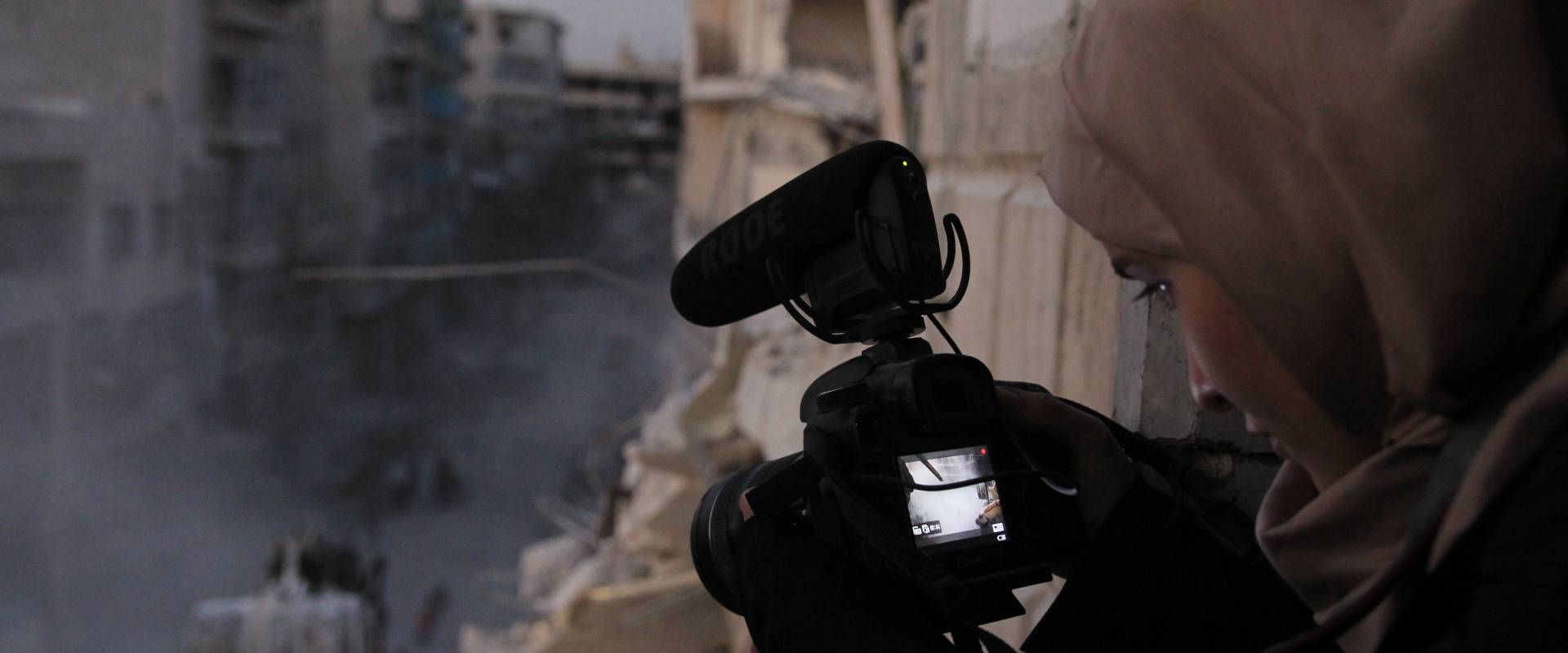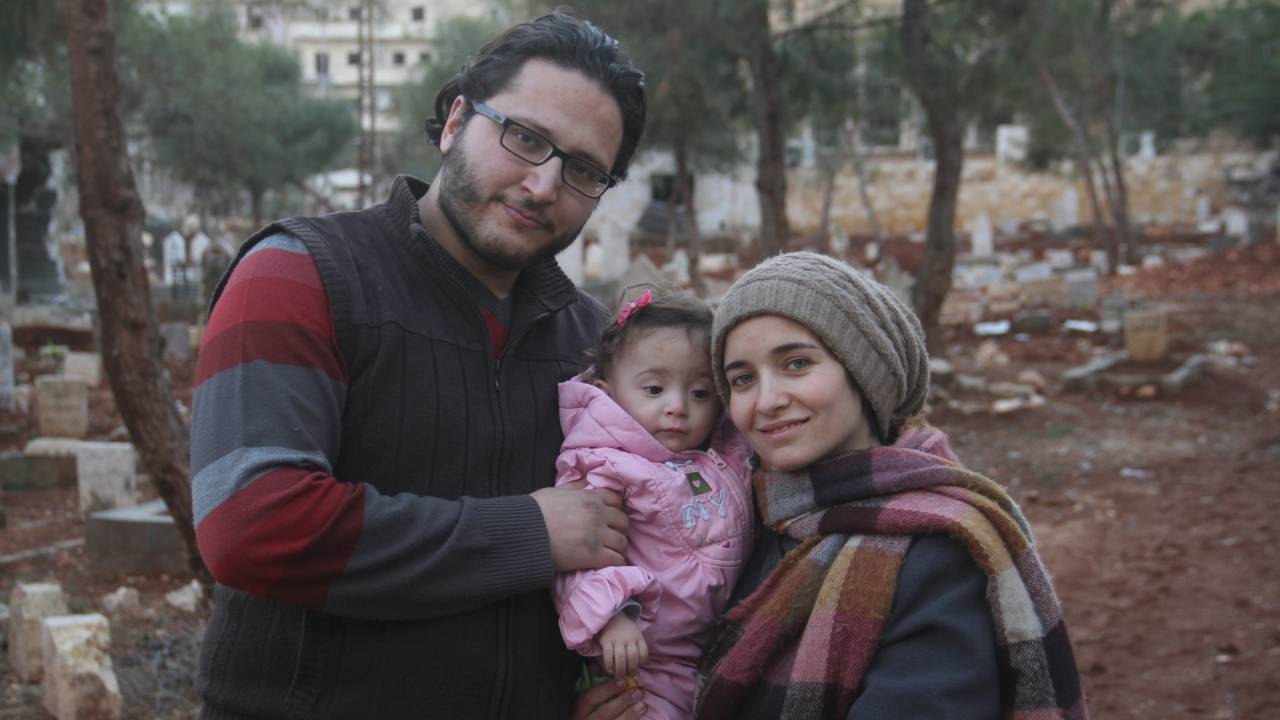Syrian journalist and filmmaker Waad al-Kateab talks to zenith about life in Aleppo under siege, taking the Syrian regime to courts, and knocking on doors the world over in pursuit of justice.
zenith: When you first picked up your camera and started filming in Aleppo, did you ever think that you would make a film like ‘For Sama’?
Waad al-Kateab: Not at all. When I started filming, I was just thinking about the immediate reaction of the people inside Syria or outside. I tried to capture everything that was happening because the regime denied everything related to the revolution. Our reaction was to film to prove what was going on. Five years later, right before we left Aleppo under siege at the end of 2016, I couldn’t think about how I would use the material. The only thing that came to mind back then was to film, everything I could, because at any second, I could have been killed. That was the only one way to save this story in case we didn’t make it out.
What was the most difficult part of reducing over 500 hours of footage to a 100-minute-long documentary?
It was challenging re-watching all the material again and again. Seeing children dying over again and over again. It was much easier for me being out there than watching the footage back. I asked myself how I could tell the best story possible, because I had over 500 hours, so many stories could’ve been included. And with every decision you take, you worry whether it was the best thing to do. I didn’t have a lot of experience in this industry compared to others, but at the same time, I went through that story myself and thought I'm the best person to work on it. Another thing was the emotional aspect, because for two years, while I was working on putting this film together, so many people told me that nobody would come to watch another Syrian film. But I still thought it was very important to do it.
Why did you decide to release this film at the time when you say people might have been overwhelmed with films on Syria?
Right after I left Syria, I thought that I didn’t want to do anything anymore. I watched the news and saw how many people watched my reports for Channel 4, but nobody did anything to change what was happening. I thought: What’s the point of any of this if doesn’t really change people’s lives? Two days later I changed my mind completely. We’d lost Aleppo and Assad still controlled Syria and we were out. At that point, maybe we’d lost everything. The only thing we have to stand against that is to fight that propaganda and to tell our version of the story, a version told by people who are totally free and not following any agenda. Not that of the opposition, nor relying on the lies of the regime, nor on depicting the most exciting story about ISIS or other extremists. I decided to stand up, and make the story as I saw it, as a normal Syrian who went through that experience. I wanted to show people things that they maybe didn’t want to see. I didn’t care about whether people would love it or be scared by it, I just wanted to tell the story as I saw it.
Was it your intention to cast your husband, Hamza al-Kateab, the director of the Al-Quds Hospital in East Aleppo, as the film’s protagonist?
The film is not about Hamza or the hospital itself. I don’t think there's any film that could cover everything that’s happened during the revolution. But through this personal story, you can pick up on so many details on what’s happened Aleppo and in other Syrian cities. Our life as a family represents to some extent the experience of the medical staff. As a journalist, you can cover family life as a way of depicting what was happening to the society in large, but that will never represent the whole of the revolution.
Why did you decide not to depict fighters from either side in the film?
The crimes in Syria have mostly been committed by the regime, but other groups have also perpetrated crimes. Both should be held accountable as part of any justice process. From day one, the regime was trying to spread misinformation. It called people, who were chanting for freedom and dignity, terrorists. It tried to drag everyone into the civil war narrative, where Syrians fight against one another, where Sunnis fight Alawis. This wasn’t the case at all. Even now, the regime tries to call it a civil war, but it can’t be, when Hezbollah, Russia and Turkey are fighting. It’s a struggle, a conflict, but not a civil war.
One of the most difficult to understand moments in the film to an audience that’s not familiar with what’s happening in Syria is your decision to return to East Aleppo in July 2016, after visiting a sick relative in Turkey. How did you come to that decision?
It was the easiest decision I’ve ever taken. There was a little bit of confusion about whether we should take Sama with us or not. In the end we decided for it. This was one of the moments, which we knew from minute one would be included in the film, because so many people asked us even before the siege: Why are you staying in Syria? I’ve tried so hard to find a simple answer to why we went back. But there is none. I decided to tell the world that we returned because there was something drawing us back to the city. This was one of the important things which the Syrian people tried to tell the world, but nobody wanted to hear. Everything we did during the revolution was to live with dignity, freedom and safety. The regime simply didn’t allow this. We fought for our lives on the ground.
Did you have any doubts about returning?
Like many Syrians, our decision to be there was natural. We knew it was very dangerous, but at the same time, we knew how important it was for Aleppo to have doctors and people who could use cameras, to make a small difference. We also couldn’t turn our back of those we had lived with for five years. It wasn’t just about us, it was about everyone. It was important to show that not all Syrians are refugees. If we had had the chance to be in a safer place for my children, maybe I would’ve taken it. But on the other hand, there are others who had the chance to get out, but didn’t want to. It’s not about what’s right or what’s wrong, both are part of the story.
How would you describe your presence in front of the camera, as well as behind, during the film?
There’s not a lot of scenes with me in during the film, which I’m happy about. The film blurs the lines between Waad the person, the mother, the wife who was living through that experience, and Waad, the filmmaker and journalist who was trying to participate in the revolution by capturing the events unfolding in the city. I believe that journalism and filmmaking are forms of activism, I can’t separate them. I became a filmmaker because I’m an activist working on Syria. That’s why I feel even if I move to another project, it will be related to Syria and activism.
‘It’s all evidence of the war crimes and all the attacks on schools, hospitals and civilians’
Could you talk about the other dimensions of the ‘For Sama’ project?
For Sama was not just a film. It’s my life. It’s not something which happens to you once and that’s it. This is something that I will never be out of. We launched an impact campaign called ‘Action for Sama’ in October 2019, where people can continue being involved in the Syrian situation through the film. We did that, because so many people asked us what they could do. We felt that it was part of our responsibility to tell people to do something. And show them where to educate oneself about what is happening in Syria, things that are natural to us with our nine years of experience.
What will become of the rest of your footage?
It’s all evidence of the war crimes and all the attacks on schools, hospitals and civilians. I have also submitted my footage to the International Impartial and Independent Mechanism (IIIM), a UN body tasked with investigating war crimes. Our main message is stop bombing hospitals and we’ve tried to raise this message at the Cannes Film Festival International and during other awards ceremonies. We are working on a legal case against Russia and the Syrian regime for the attacks on hospitals. Justice is the only thing that can heal us all as Syrians.
How do you respond to criticism you’ve received for meeting Ivanka Trump in February?
I can understand how many people would see things differently, but I didn’t meet her to talk about my personal issues, my family or my future. This is about what is happening to my country. I met her to show her pictures of what’s happening in Idlib. I’m knocking on every door in this world, and speaking to anyone who could do something. Ivanka Trump is one of a couple of people who can really make a change for people in Idlib. I don’t mind talking to her, in fact, I’m happy to.
When will you let your daughter Sama see the film?
She’s seen the trailer already. I don’t know when she would come to me and ask to watch it, but I don’t think that this would take a very long time from now, maybe in two or three years when she can really understand what she went through when she was young.
Waad al-Kateab is a 29-year-old journalist and filmmaker from Aleppo. Her husband Hamza and her two daughters, Sama and Taima, have asylum status in the UK. Her debut film ‘For Sama’ won the ‘Prix L’Œil d’Or’ for best documentary at the 2019 Cannes Film Festival. For Sama can be seen at 80 screens throughout Germany from 5 March 2020.





